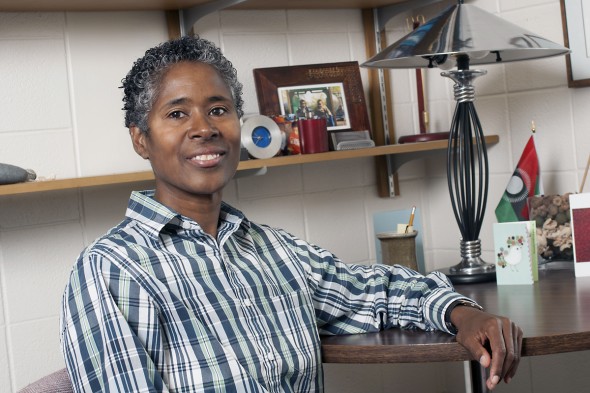Study helps LGBT smokers overcome barriers to quitting

“There’s more tolerance for smoking among the LGBT community,” says researcher Alicia Matthews. Photo: Joshua Clark
Do all smokers benefit from standard treatments, or should smoking cessation resources be tailored to specific populations?
That’s a question Alicia Matthews is trying to answer as she examines the effectiveness of smoking cessation resources for people who identify within the lesbian, gay, bisexual and transgender community.
“Not much is known about whether LGBT smokers benefit from standard treatments or if culturally tailored cessation resources can affect quit rates,” said Matthews, associate professor in health systems science in the College of Nursing.
“It’s an important population to research, given the known disparities.”
Smoking rates for LGBT individuals are about three times higher those of the general population, Matthews said.
LGBT smokers report feeling more stress and have higher rates of alcoholism and depression, which are factors strongly associated with tobacco use, she said.
“There’s more tolerance for smoking among the LGBT community than among the general population,” Matthews said. “There’s more of a live and let live attitude and less social pressure to quit.”
LGBT smokers face unique barriers to quitting, she said.
“For some, coming out is associated with higher stress and family rejection,” Matthews said.
“Some also use cigarettes as a way of establishing a social bond in places where they are going to meet other LGBT individuals. Going outside and sharing a cigarette is a low-threat way of introducing themselves.”
Since UIC became a tobacco-free campus July 1, it’s especially important that all smokers have access to resources to help them quit, Matthews said.
UIC’s tobacco-free policy prohibits all forms of tobacco: cigarettes, cigars, pipes, chewing tobacco, electronic cigarettes and smokeless tobacco products.
Her five-year study, funded by the National Institute on Drug Abuse, is accepting study participants; LGBT smokers who want help quitting can call 773-388-8868.
Participants receive six weeks of group counseling sessions, individualized counseling phone calls and a two-month supply of nicotine replacement therapy.
“The use of the patch reduces withdrawal symptoms and while smokers are becoming less nicotine-dependent, the counseling helps them learn other types of strategies for managing stress,” Matthews said.
Employees and students who want help quitting can also contact the Tobacco Treatment Center at the Outpatient Care Center, 312-996-1682, or the Illinois Tobacco Quit Line, 1-866-QUIT-YES.
“I applaud the university for making the UIC campus tobacco-free,” Matthews said.
“Tobacco-free campuses really have a tremendous positive impact.”
